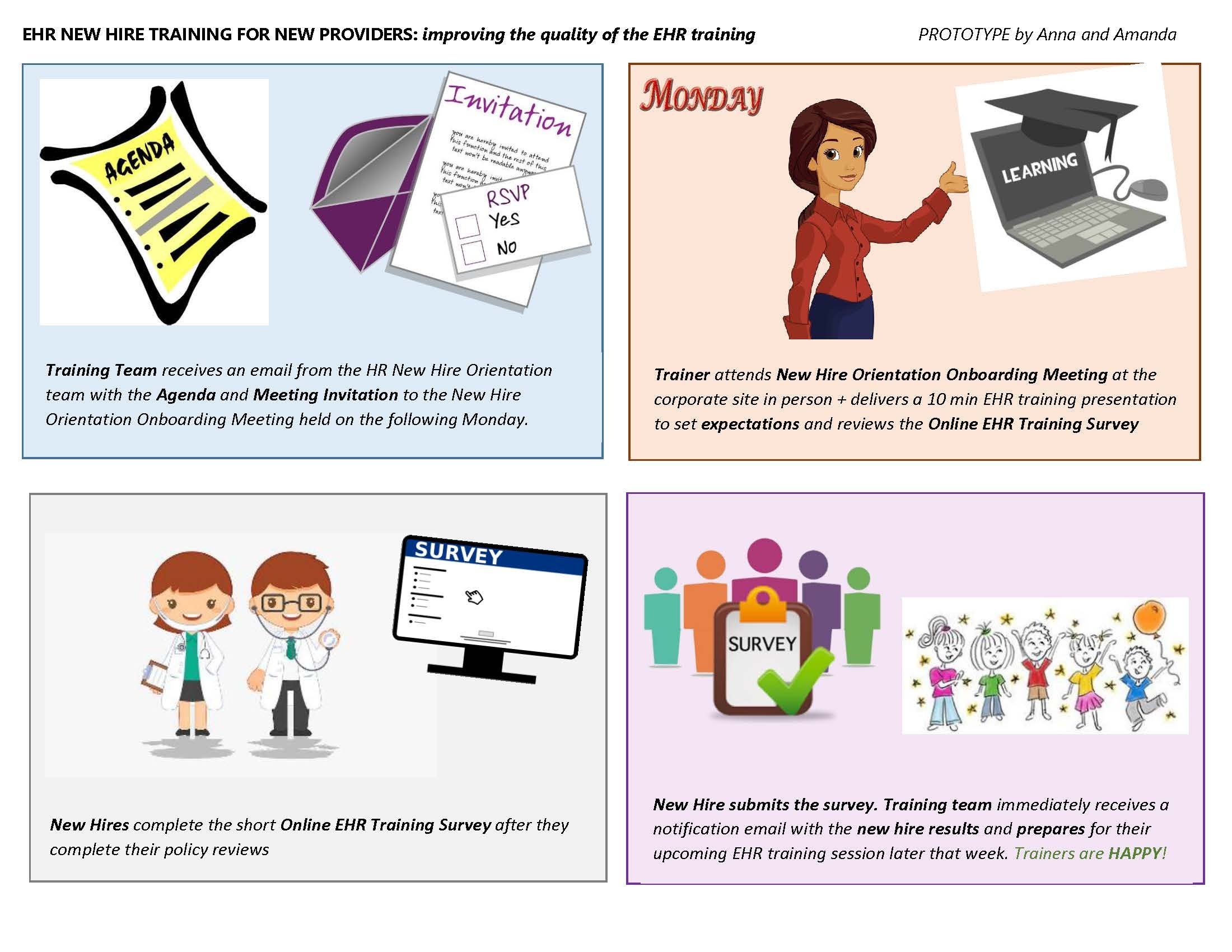Design Thinking Class - Training Intervention Final Project
For my Design Thinking class’ final project, I was paired with an Atrius Health trainer and tasked to restructure the Atrius onboarding process since the current process was failing.
Our full slideshow that we presented to the class can be found here. We received an A for our final project grade.
The Problem:
Training team sends Outlook email to new provider
99% of providers do not read emails
Only 10% completing online assessment form
Trainer unable to fully prepare for training
Wasted time + Trainings not well received
I had no prior knowledge about Healthcare or Atrius, so I met with my teammate and her colleagues in order to ask questions and gain more background knowledge.
I also created a Typeform Survey and sent this to current onboarding representatives at Atrius, to gain more data around where the issue was occurring.
Background Information:
EHR Training is mandatory for new providers
Training scheduled few days after date of hire
New Provider completes assessment prior to training
Trainings tailored produces successful training outcomes + new providers accurately and effectively chart in the EHR system
Overview of the Process:
My teammate and I met a few times, so I could learn more context on the training, it’s importance in the flow of the healthcare system, key players, stakeholders, and environment.
Gathered Information - we knew we wanted more context, data and information from the stakeholders. We decided on sending a digital survey to all trainers and onboarding people. The survey helped us classify with numbers the pain points and where people were getting stuck in the process, but we wanted interpersonal information and quotes as well, so Amanda interviewed some trainers 1:1 to gather quotes and information as well. We strived for both qualitative and quantitative information.
After gathering the qualitative and quantitative information, we met again to discuss and analyze the information. Here we were able to gather a full story.
Once we had the full story, we were able to identify the true issue - new hires do not have access to their emails yet and the training was later in the OBS process and looked at as another thing to get done.
As a class, using the field book, we all brainstormed ideas through using the organizational tools in the book that lead you to identify the issue and help guide you to a correct area of thinking, staying on task and incorporating all stakeholders.
Final resolution - using the book and class constructive criticism we discovered the most helpful solution for stakeholders would be a quick presentation from a trainer or Amanda on the importance of the EHR training at the onboarding students mandatory Monday training, training assessment (survey) online which will consist of evaluating their skill set and entering details about their clinical workflow based on their speciality. Results are immediately sent to the training team and on Monday afternoon the trainer can prepare for their upcoming training session with that new hire later that week (either Wednesday or Thursday.... Some may even be scheduled on Tuesday.) The new hire gets 1 EHR training session that is typically 4 hours long. (They need this session in order to begin seeing and charting on patients).
Finally, this led to our Solution:
New Hire Orientation Onboarding meeting every Monday
Trainer attends New Hire Orientation Onboarding Meeting
Delivers 10-minute EHR training presentation
Reviews online EHR Training Assessment
New providers complete assessment at the meeting
Results of assessment immediately sent to Training team
Trainer prepares for upcoming training session with new provider
These are the prototypes of the solutions:
In Conclusion:
This new process of using the direct information given to us by new hires will create a more customized and impactful training for both the new hires and the trainers.
Working together & listening to each other’s needs and questions results in more powerful answers and practices.
Human centered design starts and ends with listening to the people involved!
Thank you!

